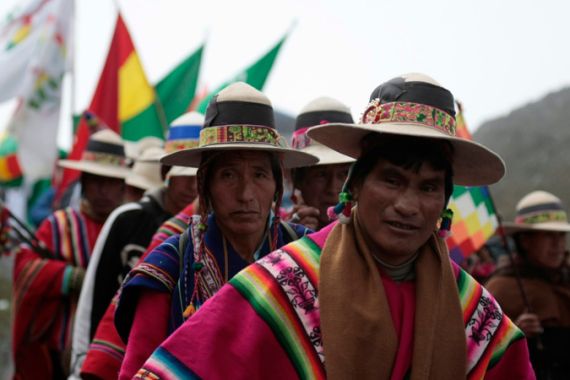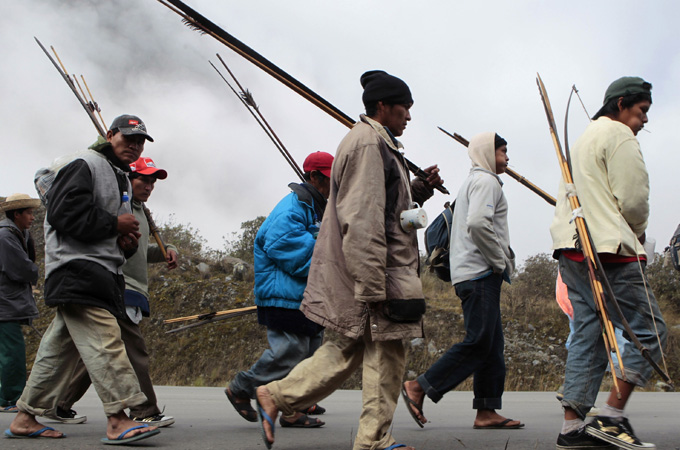Bolivian protesters arrive in La Paz
Nearly 2,000 indigenous Bolivians reach Andean capital after two-month march from their Amazonian homeland.

 |
| Nearly 2,000 indigenous Bolivians marched 600km to protest over plans to build a road through their land [Reuters] |
Hundreds of indigenous Bolivians have made a triumphal entry into La Paz at the end of a two-month march from the Amazon to oppose the construction of a highway through their ancestral homeland.
The nearly 2,000 marchers, who set out in August and trekked 600km from the lowlands high into the Andes, were greeted as heroes on Wednesday as they entered the capital accompanied by a massive crowd of supporters.
| IN VIDEO |
|
Indigenous activists protest new road in Amazon region |
Al Jazeera’s Gabriel Elizondo, reporting near La Paz, explained that “it was 1,500 that walked that entire distance and now they’re joined by, I can estimate, exactly tens of thousands more.. .that are following them into the city”.
People lining the streets waved Bolivian flags and white handkerchiefs, and cheered and applauded as the marchers passed.
Police and a riot control vehicle were withdrawn from the plaza outside the presidential palace as a gesture of goodwill, and President Evo Morales’ information minister extended an official welcome to the protesters.
The protesters oppose plans to build a road through the pristine Isiboro Secure National Park and Indigenous Territory that would level an ancestral homeland inhabited by 50,000 people from three different native groups.
Although the project has been suspended, the marchers want it killed for good.
‘Rallying cry’
Al Jazeera’s correspondent reported that the march had transformed from a single-issue demonstration to something resembling a national referendum on Morales’ government.
“The 1,500 that originally made up this march, that’s what they were fighting for, to stop this road. But this has turned from a local issue to a national issue,” said Elizondo.
“And as you can see from all the people that have joined in, this has really become more of a rallying cry for anybody in Bolivia that feels as though Evo Morales, the president, hasn’t completely lived up to the expectations to represent the indigenous majority of this country.”
Morales, elected in 2005, is the country’s first president from Bolivia’s indigenous majority.
Facing the biggest challenge yet from indigenous people in his five years in office, Morales offered late Tuesday to meet with them for talks upon their arrival.
Our correspondent reported that “They pretty much said to him, ‘Wait until we get to La Paz then we’ll decide if we want to talk to you'”.
“The power right now in Bolivia is with the marchers,” he continued.
“They have force in numbers right now and Evo Morales is, all the analysts here will say, on his heels. He’s backing up.”